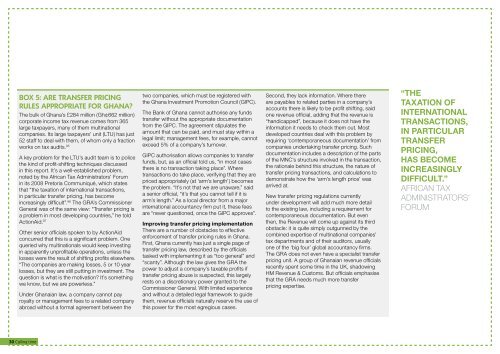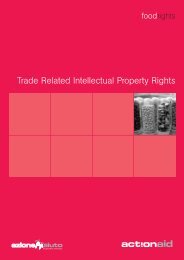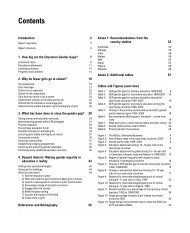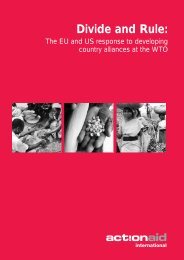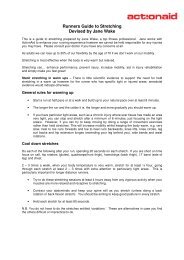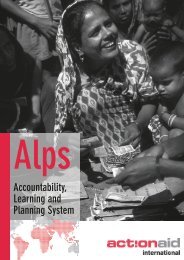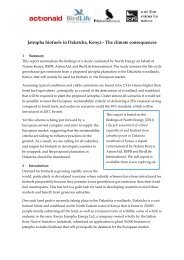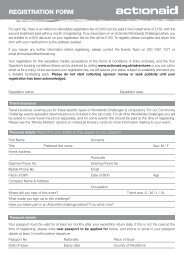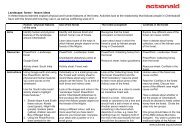You also want an ePaper? Increase the reach of your titles
YUMPU automatically turns print PDFs into web optimized ePapers that Google loves.
Box 5: are transfer pricinG<br />
rules appropriate for Ghana?<br />
The bulk of Ghana’s £284 million (Gh¢662 million)<br />
corporate income tax revenue comes from 365<br />
large taxpayers, many of them multinational<br />
companies. Its large taxpayers’ unit (LTU) has just<br />
52 staff to deal with them, of whom only a fraction<br />
works on tax audits. 95<br />
A key problem for the LTU’s audit team is to police<br />
the kind of profit-shifting techniques discussed<br />
in this report. It’s a well-established problem,<br />
noted by the African Tax Administrators’ Forum<br />
in its 2008 Pretoria Communiqué, which states<br />
that “the taxation of international transactions,<br />
in particular transfer pricing, has become<br />
increasingly difficult”. 96 The GRA’s Commissioner<br />
General was of the same view: “Transfer pricing is<br />
a problem in most developing countries,” he told<br />
<strong>ActionAid</strong>. 97<br />
Other senior officials spoken to by <strong>ActionAid</strong><br />
concurred that this is a significant problem. One<br />
queried why multinationals would keep investing<br />
in apparently unprofitable operations, unless the<br />
losses were the result of shifting profits elsewhere.<br />
“The companies are making losses, 5 or 10 year<br />
losses, but they are still putting in investment. The<br />
question is what is the motivation? It’s something<br />
we know, but we are powerless.”<br />
Under Ghanaian law, a company cannot pay<br />
royalty or management fees to a related company<br />
abroad without a formal agreement between the<br />
30 <strong>Calling</strong> time<br />
two companies, which must be registered with<br />
the Ghana Investment Promotion Council (GIPC).<br />
The Bank of Ghana cannot authorise any funds<br />
transfer without the appropriate documentation<br />
from the GIPC. The agreement stipulates the<br />
amount that can be paid, and must stay within a<br />
legal limit; management fees, for example, cannot<br />
exceed 5% of a company’s turnover.<br />
GIPC authorisation allows companies to transfer<br />
funds, but, as an official told us, “in most cases<br />
there is no transaction taking place”. Where<br />
transactions do take place, verifying that they are<br />
priced appropriately (at ‘arm’s length’) becomes<br />
the problem. “It’s not that we are unaware,” said<br />
a senior official, “it’s that you cannot tell if it is<br />
arm’s length.” As a local director from a major<br />
international accountancy firm put it, these fees<br />
are “never questioned, once the GIPC approves”.<br />
Improving transfer pricing implementation<br />
There are a number of obstacles to effective<br />
enforcement of transfer pricing rules in Ghana.<br />
First, Ghana currently has just a single page of<br />
transfer pricing law, described by the officials<br />
tasked with implementing it as “too general” and<br />
“scanty”. Although the law gives the GRA the<br />
power to adjust a company’s taxable profits if<br />
transfer pricing abuse is suspected, this largely<br />
rests on a discretionary power granted to the<br />
Commissioner General. With limited experience<br />
and without a detailed legal framework to guide<br />
them, revenue officials naturally reserve the use of<br />
this power for the most egregious cases.<br />
Second, they lack information. Where there<br />
are payables to related parties in a company’s<br />
accounts there is likely to be profit shifting, said<br />
one revenue official, adding that the revenue is<br />
“handicapped”, because it does not have the<br />
information it needs to check them out. Most<br />
developed countries deal with this problem by<br />
requiring ‘contemporaneous documentation’ from<br />
companies undertaking transfer pricing. Such<br />
documentation includes a description of the parts<br />
of the MNC’s structure involved in the transaction,<br />
the rationale behind this structure, the nature of<br />
transfer pricing transactions, and calculations to<br />
demonstrate how the ‘arm’s length price’ was<br />
arrived at.<br />
New transfer pricing regulations currently<br />
under development will add much more detail<br />
to the existing law, including a requirement for<br />
contemporaneous documentation. But even<br />
then, the Revenue will come up against its third<br />
obstacle: it is quite simply outgunned by the<br />
combined expertise of multinational companies’<br />
tax departments and of their auditors, usually<br />
one of the ‘big four’ global accountancy firms.<br />
The GRA does not even have a specialist transfer<br />
pricing unit. A group of Ghanaian revenue officials<br />
recently spent some time in the Uk, shadowing<br />
HM Revenue & Customs. But officials emphasise<br />
that the GRA needs much more transfer<br />
pricing expertise.<br />
“The<br />
TAxATIon of<br />
InTeRnATIonAl<br />
TRAnSACTIonS,<br />
In PARTICulAR<br />
TRAnSfeR<br />
PRICIng,<br />
hAS beCoMe<br />
InCReASIngly<br />
DIffICulT.”<br />
AFRICAN TAx<br />
ADMINISTRATORS’<br />
FORUM


